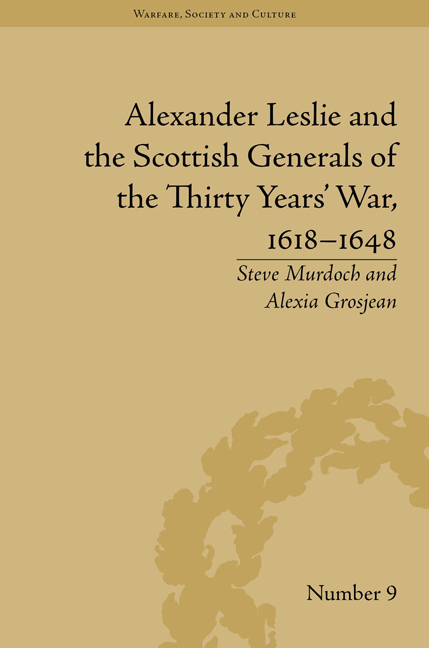Book contents
- Frontmatter
- CONTENTS
- Dedication
- Acknowledgements
- Abbreviations
- Stylistic Conventions
- Introduction
- 1 Scotland's Indigenous Military Cultures
- 2 The Scottish Military Diaspora
- 3 The Thirty Years' War Campaigns: Stralsund to Prague, 1628–35
- 4 Alexander Leslie and the Army of the Weser, 1635–9
- 5 The Home Front: Leslie, Ruthven and the Bishops' Wars, 1638–41
- 6 The Scottish ‘Veteran Generals’ in England, 1642–7
- 7 Going Full Circle: The New Scottish Command in Europe, 1639–48
- Conclusion
- Appendix
- Notes
- Works Cited
- Index
1 - Scotland's Indigenous Military Cultures
- Frontmatter
- CONTENTS
- Dedication
- Acknowledgements
- Abbreviations
- Stylistic Conventions
- Introduction
- 1 Scotland's Indigenous Military Cultures
- 2 The Scottish Military Diaspora
- 3 The Thirty Years' War Campaigns: Stralsund to Prague, 1628–35
- 4 Alexander Leslie and the Army of the Weser, 1635–9
- 5 The Home Front: Leslie, Ruthven and the Bishops' Wars, 1638–41
- 6 The Scottish ‘Veteran Generals’ in England, 1642–7
- 7 Going Full Circle: The New Scottish Command in Europe, 1639–48
- Conclusion
- Appendix
- Notes
- Works Cited
- Index
Summary
With Leslie war, and war only, was his métier
The principal Scottish generals discussed in this book – Alexander Leslie, Patrick Ruthven and James King – were born in the early reign of James VI and had direct or closely associated contact with violence at a familial or national level in their youth. It is arguable that the violence inherent in Scottish society in the later sixteenth century in some way fuelled their decision to enter military service. As discussed in Chapter 2, this choice eventually required them to move abroad in an effort to escape the violence or regain prestige for their family or even simply to earn a living. The Scottish proclivity for warlike behaviour has long dominated accounts of the nation's history. It is particularly evident in the stereotypical image of the early modern Scottish soldier – an image itself often drawn from, and conflating, a prejudicial view of Scottish ‘incivility’ and seasonal mercenary service in Ireland undertaken by men levied in the Highlands. Modern scholarship has done much to challenge and address our perceptions of the Scots, and Scottish Gael in particular, in this context. Scottish mercenaries certainly could be found in the period but, as discussed below, these did not represent the full extent of Scottish military power at home, nor did they even represent the main vehicle for Scottish military intervention abroad.
- Type
- Chapter
- Information
- Publisher: Pickering & ChattoFirst published in: 2014



